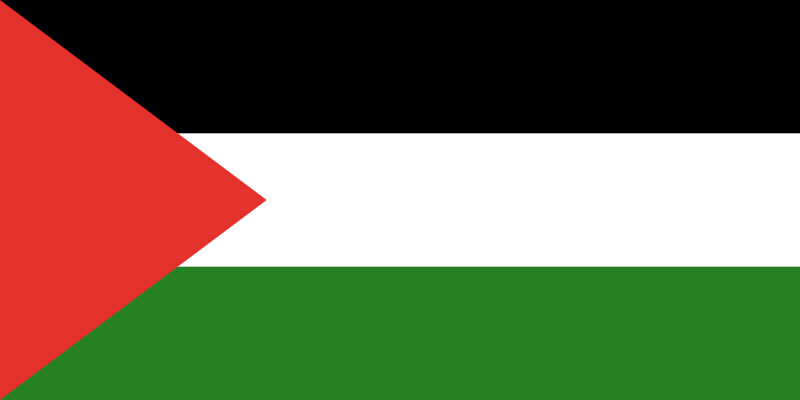(Added a "Palestian response" section, will work on it again later) Tag: Visual edit |
(added sourcing + a few revisions, WIP.) Tag: Visual edit |
||
| Line 41: | Line 41: | ||
==== The Plan ==== | ==== The Plan ==== | ||
Unable to resolve the conflict between Palestinians and settlers, Britain withdrew from Palestine in February 1947 and transferred the matter to the UN, which in turn entrusted it to [[UNSCOP]]. | Unable to resolve the conflict between Palestinians and settlers, Britain withdrew from Palestine in February 1947 and transferred the matter to the UN, which in turn created and entrusted it to [[UNSCOP]] (United Nations Special Committee on Palestine) in May 1947. | ||
While UNSCOP did deliberate about the possibility of a democratic one-state solution, whose future would be determined through democratic organs, they ended up adopting a partition plan which divided Palestine into two states: "Israel", occupying 56% of all Palestinian land and containing the Eastern Galilee, a coastal area (including Haifa, Tel Aviv, and most fertile lowland plains) and most of the Negev, and Palestine, consisting of the remaining territories, except for Jerusalem, which was to be considered ''corpus separatum''.<ref>{{Web citation|author=Alex Winder|newspaper=Palquest|title=UN Partition Plan, 1947|url=https://palquest.palestine-studies.org/sites/default/files/Revisiting_the_UNGA_Partition_Resolution-Walid_Khalidi.pdf|archive-url=https://web.archive.org/web/20240129081137/https://palquest.palestine-studies.org/sites/default/files/Revisiting_the_UNGA_Partition_Resolution-Walid_Khalidi.pdf|archive-date=2024-1-9|retrieved=2024-6-20|quote=The proposed Jewish state covered some 56 percent of Mandate Palestine divided into three barely contiguous parts/areas: the eastern Galilee (including Safad, Tiberias, Baysan, and the Sea of Galilee), a coastal area (about two-thirds of Palestine's coast, including Haifa, Tel Aviv, and the fertile lowland plains), and most of the Negev (excluding Bir al-Sabi' and a strip/area running about half-way down the border with Egypt, but giving access to the Red Sea). Of Mandate Palestine's sixteen districts, nine were allotted to the Jewish state, only one of which had a Jewish majority; the UN-proposed Jewish state as a whole had an Arab “minority” approaching 47 percent.}}</ref> Additionally, it is also worth mentioning that even within the UN-proposed state, settlers owned only 11% of the land and were the minority in every single district, further adding to the absurdity that was this plan.<ref>{{Citation|author=Ilan Pappe|year=2006|title=The Ethnic Cleansing of Palestine|chapter=Chapter 3|section=The Arab and Palestinian Positions|page=34|quote=The injustice was as striking then as it appears now, and yet it was hardly commented on at the time by any of the leading Western newspapers then covering Palestine: the Jews, who owned less than six per cent of the total land area of Palestine and constituted no more than one third of the population, were handed more than half of its overall territory. Within the borders of their UN -proposed state, they owned only eleven per cent of the land, and were the minority in every district|pdf=https://cloudflare-ipfs.com/ipfs/bafykbzacedod4irl7doqf2n5iym5sa2eyrmk6ql2zs7yq7yznvezr26fielzc?filename=Ilan%20Pappe%20-%20The%20Ethnic%20Cleansing%20of%20Palestine-Oneworld%20%282006%29.pdf|publisher=Oneworld|isbn=9781851684670|lg=http://libgen.rs/book/index.php?md5=44F7CEAB3B4EA784451D636BC648D02F}}</ref> | While UNSCOP did deliberate about the possibility of a democratic one-state solution, whose future would be determined through democratic organs, they ended up adopting a partition plan which divided Palestine into two states: "Israel", occupying 56% of all Palestinian land and containing the Eastern Galilee, a coastal area (including Haifa, Tel Aviv, and most fertile lowland plains) and most of the Negev, and Palestine, consisting of the remaining territories, except for Jerusalem, which was to be considered ''corpus separatum''.<ref>{{Web citation|author=Alex Winder|newspaper=Palquest|title=UN Partition Plan, 1947|url=https://palquest.palestine-studies.org/sites/default/files/Revisiting_the_UNGA_Partition_Resolution-Walid_Khalidi.pdf|archive-url=https://web.archive.org/web/20240129081137/https://palquest.palestine-studies.org/sites/default/files/Revisiting_the_UNGA_Partition_Resolution-Walid_Khalidi.pdf|archive-date=2024-1-9|retrieved=2024-6-20|quote=The proposed Jewish state covered some 56 percent of Mandate Palestine divided into three barely contiguous parts/areas: the eastern Galilee (including Safad, Tiberias, Baysan, and the Sea of Galilee), a coastal area (about two-thirds of Palestine's coast, including Haifa, Tel Aviv, and the fertile lowland plains), and most of the Negev (excluding Bir al-Sabi' and a strip/area running about half-way down the border with Egypt, but giving access to the Red Sea). Of Mandate Palestine's sixteen districts, nine were allotted to the Jewish state, only one of which had a Jewish majority; the UN-proposed Jewish state as a whole had an Arab “minority” approaching 47 percent.}}</ref> Additionally, it is also worth mentioning that even within the UN-proposed state, settlers owned only 11% of the land and were the minority in every single district, further adding to the absurdity that was this plan.<ref>{{Citation|author=Ilan Pappe|year=2006|title=The Ethnic Cleansing of Palestine|chapter=Chapter 3|section=The Arab and Palestinian Positions|page=34|quote=The injustice was as striking then as it appears now, and yet it was hardly commented on at the time by any of the leading Western newspapers then covering Palestine: the Jews, who owned less than six per cent of the total land area of Palestine and constituted no more than one third of the population, were handed more than half of its overall territory. Within the borders of their UN -proposed state, they owned only eleven per cent of the land, and were the minority in every district|pdf=https://cloudflare-ipfs.com/ipfs/bafykbzacedod4irl7doqf2n5iym5sa2eyrmk6ql2zs7yq7yznvezr26fielzc?filename=Ilan%20Pappe%20-%20The%20Ethnic%20Cleansing%20of%20Palestine-Oneworld%20%282006%29.pdf|publisher=Oneworld|isbn=9781851684670|lg=http://libgen.rs/book/index.php?md5=44F7CEAB3B4EA784451D636BC648D02F}}</ref> | ||
After November 1947, as a way of protesting against the blind-eye that the UN was turning to the Palestinians who overwhelmingly rejected the proposed plan, the [[Arab Higher League|Arab League]] and the [[Arab Higher Committee]] decided to boycott further negotiations with [[UNSCOP]].<ref>{{Citation|author=Ilan Pappe|year=2006|title=The Ethnic Cleansing of Palestine|title-url=http://libgen.rs/book/index.php?md5=44F7CEAB3B4EA784451D636BC648D02F|chapter=Chapter 3|section=The UN's Partition Plan|page=32|quote=The Arab League, the regional inter-Arab Organisation, and the Arab Higher Committee (the embryonic Palestinian government) decided to boycott the negotiations with UNSCOP prior to the UN resolution, and did not take part in the deliberations on how best to implement it after November 1947. Into this vacuum the Zionist leadership stepped with ease and confidence, quickly setting up a bilateral dialogue with the UN on how to work out a scheme for the future of Palestine.|publisher=Oneworld|isbn=9781851684670|lg=http://libgen.rs/book/index.php?md5=44F7CEAB3B4EA784451D636BC648D02F|trans-lang=English}}</ref> | |||
==== The Palestinian Response ==== | ==== The Palestinian Response ==== | ||
As stated earlier, the Arab League further refused to negotiate with | As stated earlier, the Arab League further refused to negotiate with [[UNSCOP]]. This fact is often used to support the argument that Palestinians would have a better state had they accepted the Partition Plan. However, this couldn't be further from the truth, as in order to say this one has to ignore the entire history of the Zionist movement, its settler-colonial ambitions, very much aligned with European Imperialist nations<ref>{{Citation|author=Stephen Halbrook|year=1972|title=The Class Origins of Zionist Ideology|title-url=https://annas-archive.org/md5/879dffa8a9c9ef6fbfe91cdab7f68448|section=Herzl|page=98|quote=Throughout these and other talks, Herzl reiterates the identity of interests between imperialism and Zionism, arguing that British support of his plans would ensure pro-British fifth columnists as well as markets. "In some short years the Empire would be richer by a rich colony," and, he adds, in reference to the Jews: "at one stroke England will get ten million secret subjects," "ten million agents for her greatness and her influence," who would also cater to the English market|pdf=https://momot.rs/d3/y/1718971011/10000/u/zlib3_files/20231230/annas_archive_data__aacid__zlib3_files__20231230T013219Z--20231230T013220Z/aacid__zlib3_files__20231230T013219Z__26743366__kNxsYfF3cX3amMvvjmitV6~/2H3F3jCCKsEUBAZrWLVeZw/The%20Class%20Origins%20of%20Zionist%20Ideology%20--%20Stephen%20Halbrook%20--%201972%20--%20University%20of%20Californa%20--%20879dffa8a9c9ef6fbfe91cdab7f68448%20--%20Anna%E2%80%99s%20Archive.pdf|city=California|publisher=University of California Press|trans-lang=English}}</ref>, and how it always advocated for the systematic expulsion of the Palestinians from their own land.<ref>{{Web citation|newspaper=Decolonize Palestine|title=Myth: Israel was created as penance for the Holocaust|url=https://decolonizepalestine.com/myth/israel-penance-for-holocaust/|archive-url=https://web.archive.org/web/20240521001122/https://decolonizepalestine.com/myth/israel-penance-for-holocaust/|archive-date=May 21 2024|retrieved=June 21 2024|quote=“We should go east, into Transjordan. That would be a test for our movement.” | ||
“Nonsense… isn’t there enough land in Judea and Galilee?” | “Nonsense… isn’t there enough land in Judea and Galilee?” | ||
“The land in Judea and Galilee is occupied by the Arabs.” | “The land in Judea and Galilee is occupied by the Arabs.” | ||
| Line 57: | Line 57: | ||
“It is very simple, we’ll harass them until they get out… Let them go to Transjordan.” | “It is very simple, we’ll harass them until they get out… Let them go to Transjordan.” | ||
“And are we going to abandon all of Transjordan?” asks an anxious voice. | “And are we going to abandon all of Transjordan?” asks an anxious voice. | ||
“As soon as we have a big settlement here we’ll seize the land, we’ll become strong, and then we’ll take care of the Left Bank [of the Jordan River], we’ll expel them from there, too. Let them go back to the Arab countries.”}}</ref> | “As soon as we have a big settlement here we’ll seize the land, we’ll become strong, and then we’ll take care of the Left Bank [of the Jordan River], we’ll expel them from there, too. Let them go back to the Arab countries.”}}</ref> By allowing this plan to come into fruition, the UN had fundamentally violated its own human rights charter. | ||
Furthermore, it is natural that Palestinians rejected this plan, as it went directly against their interests (and violated their right of self-determination) and would further intensify the ethnic cleansing operations. Therefore, it is obvious that such a plan could only be enacted by overwhelming force, since it is obviously impossible to forcibly expand the colonizer's reach from 6%<ref>{{Citation|author=Ilan Pappe|year=2006|title=The Ethnic Cleansing of Palestine|chapter=Chapter 3|section=The Arab and Palestinian Positions|page=34|quote=The injustice was as striking then as it appears now, and yet it was hardly commented on at the time by any of the leading Western newspapers then covering Palestine: the Jews, who owned less than six per cent of the total|pdf=https://cloudflare-ipfs.com/ipfs/bafykbzacedod4irl7doqf2n5iym5sa2eyrmk6ql2zs7yq7yznvezr26fielzc?filename=Ilan%20Pappe%20-%20The%20Ethnic%20Cleansing%20of%20Palestine-Oneworld%20%282006%29.pdf|publisher=Oneworld|isbn=9781851684670|lg=http://libgen.rs/book/index.php?md5=44F7CEAB3B4EA784451D636BC648D02F|trans-lang=English}}</ref> to almost 56%<ref>{{Web citation|newspaper=Decolonize Palestine|title=Myth: Had Palestinians accepted the 1947 partition plan, they would have had a state by now|url=https://decolonizepalestine.com/myth/had-palestinians-accepted-the-1947-partition-plan-they-would-have-had-a-state-by-now/|archive-url=https://web.archive.org/web/20240521000358/https://decolonizepalestine.com/myth/had-palestinians-accepted-the-1947-partition-plan-they-would-have-had-a-state-by-now/|archive-date=May 21 2024|retrieved=June 21 2024|quote=If we consider that most of this population arrived during the 4th and 5th Aliyot (Between 1924-1939), then the majority of those demanding partition of the land had barely been living there for 20 years at the most. To make matters worse, the UN partition plan allotted approximately 56% of the land of mandatory Palestine to the Jewish state.}}</ref> of all Palestinian land without Palestinian support | Several leading Palestinians also attempted to get the [[International Court of Justice]] (ICJ) involved in order to question the ethics of the plan, namely if the UN had the authority to forcefully execute the resolution<ref>{{Citation|author=Walid Khalidi|year=1997|title=Revisiting the UNGA Partition Plan Resolution|title-url=https://www.palquest.org/sites/default/files/Revisiting_the_UNGA_Partition_Resolution-Walid_Khalidi.pdf|page=9|quote=The Arab delegations requested that before a decision be taken, the International | ||
Court of Justice be asked for its opinion on the following subjects: (a) whether or not Palestine was included in the Arab territories that had been promised independence by Britain at the end of World War I; (b) whether partition was consistent with the objectives and provisions of the Mandate; (c) whether partition was consistent with the principles of the UN Charter; (d) whether its adoption and forcible execution were within the competence or jurisdiction of the UN; and (e) whether it lay within the power of any UN member or group of members to implement partition without the consent of the majority of the people living within the country.|pdf=https://www.palquest.org/sites/default/files/Revisiting_the_UNGA_Partition_Resolution-Walid_Khalidi.pdf|publisher=Journal of Palestine Studies|trans-lang=English}}</ref> without the approval of the overwhelming majority of Palestinians<ref>{{Citation|author=Walid Khalidi|year=1997|title=Revisiting the UNGA Partition Resolution|title-url=https://www.palquest.org/sites/default/files/Revisiting_the_UNGA_Partition_Resolution-Walid_Khalidi.pdf|page=1|quote=The partition resolution meant, in effect, the establishment of a Zionist state on Palestinian soil irrespective of the wishes of the overwhelming majority of its inhabitants and was taken by the Zionist leadership as a green light to launch their long-contemplated and delayed conquest of such a state.|pdf=https://www.palquest.org/sites/default/files/Revisiting_the_UNGA_Partition_Resolution-Walid_Khalidi.pdf|publisher=Journal of Palestine Studies|trans-lang=English}}</ref> violated the UN human rights charter; a counter resolution was passed to give the UN the authority to do so.<ref>{{Citation|author=Walid Khalidi|year=1997|title=Revisiting the UNGA Partition Resolution|title-url=https://www.palquest.org/sites/default/files/Revisiting_the_UNGA_Partition_Resolution-Walid_Khalidi.pdf|page=9|quote=The draft counter resolution that said that the UN did have the authority was carried by only 21 votes to 20 in the Ad Hoc Committee whose total membership was 57.|pdf=https://www.palquest.org/sites/default/files/Revisiting_the_UNGA_Partition_Resolution-Walid_Khalidi.pdf|publisher=Journal of Palestinian Studies|trans-lang=English}}</ref> | |||
Furthermore, it is natural that Palestinians rejected this plan, as it went directly against their interests (and violated their right of self-determination) and would further intensify the ethnic cleansing operations. Therefore, it is obvious that such a plan could only be enacted by overwhelming force, since it is obviously impossible to forcibly expand the colonizer's reach from 6%<ref>{{Citation|author=Ilan Pappe|year=2006|title=The Ethnic Cleansing of Palestine|chapter=Chapter 3|section=The Arab and Palestinian Positions|page=34|quote=The injustice was as striking then as it appears now, and yet it was hardly commented on at the time by any of the leading Western newspapers then covering Palestine: the Jews, who owned less than six per cent of the total|pdf=https://cloudflare-ipfs.com/ipfs/bafykbzacedod4irl7doqf2n5iym5sa2eyrmk6ql2zs7yq7yznvezr26fielzc?filename=Ilan%20Pappe%20-%20The%20Ethnic%20Cleansing%20of%20Palestine-Oneworld%20%282006%29.pdf|publisher=Oneworld|isbn=9781851684670|lg=http://libgen.rs/book/index.php?md5=44F7CEAB3B4EA784451D636BC648D02F|trans-lang=English}}</ref> to almost 56%<ref>{{Web citation|newspaper=Decolonize Palestine|title=Myth: Had Palestinians accepted the 1947 partition plan, they would have had a state by now|url=https://decolonizepalestine.com/myth/had-palestinians-accepted-the-1947-partition-plan-they-would-have-had-a-state-by-now/|archive-url=https://web.archive.org/web/20240521000358/https://decolonizepalestine.com/myth/had-palestinians-accepted-the-1947-partition-plan-they-would-have-had-a-state-by-now/|archive-date=May 21 2024|retrieved=June 21 2024|quote=If we consider that most of this population arrived during the 4th and 5th Aliyot (Between 1924-1939), then the majority of those demanding partition of the land had barely been living there for 20 years at the most. To make matters worse, the UN partition plan allotted approximately 56% of the land of mandatory Palestine to the Jewish state.}}</ref> of all Palestinian land without Palestinian support. | |||
=== Zionist colonization (1948–present) === | === Zionist colonization (1948–present) === | ||
Latest revision as of 20:46, 21 June 2024
| State of Palestine دولة فلسطين | |
|---|---|
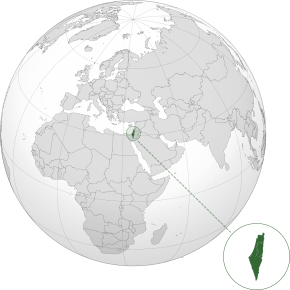 Map of Palestine, including areas occupied by Israel. | |
| Capital (partially occupied by the Zionist Entity) | Jerusalem |
| Capital-in-exile | Ramallah |
| Largest city | Gaza City |
| Official languages | Arabic |
| Leaders | |
• President | Mahmoud Abbas |
• Prime Minister | Mohammad Shtayyeh |
| History | |
• Declaration of Independence | 15 November 1988 |
Palestine, officially the State of Palestine, is an independent state in West Asia that is almost entirely occupied by the Zionist Entity.[1]
History[edit | edit source]
Medieval history[edit | edit source]
During the Mamluk Sultanate, the Palestinian city of Jenin was a central station for the postal service between Cairo and Damascus. The Ottoman Empire ruled Palestine for 401 years, starting in the 16th century.[2]
Early Zionist settlement[edit | edit source]
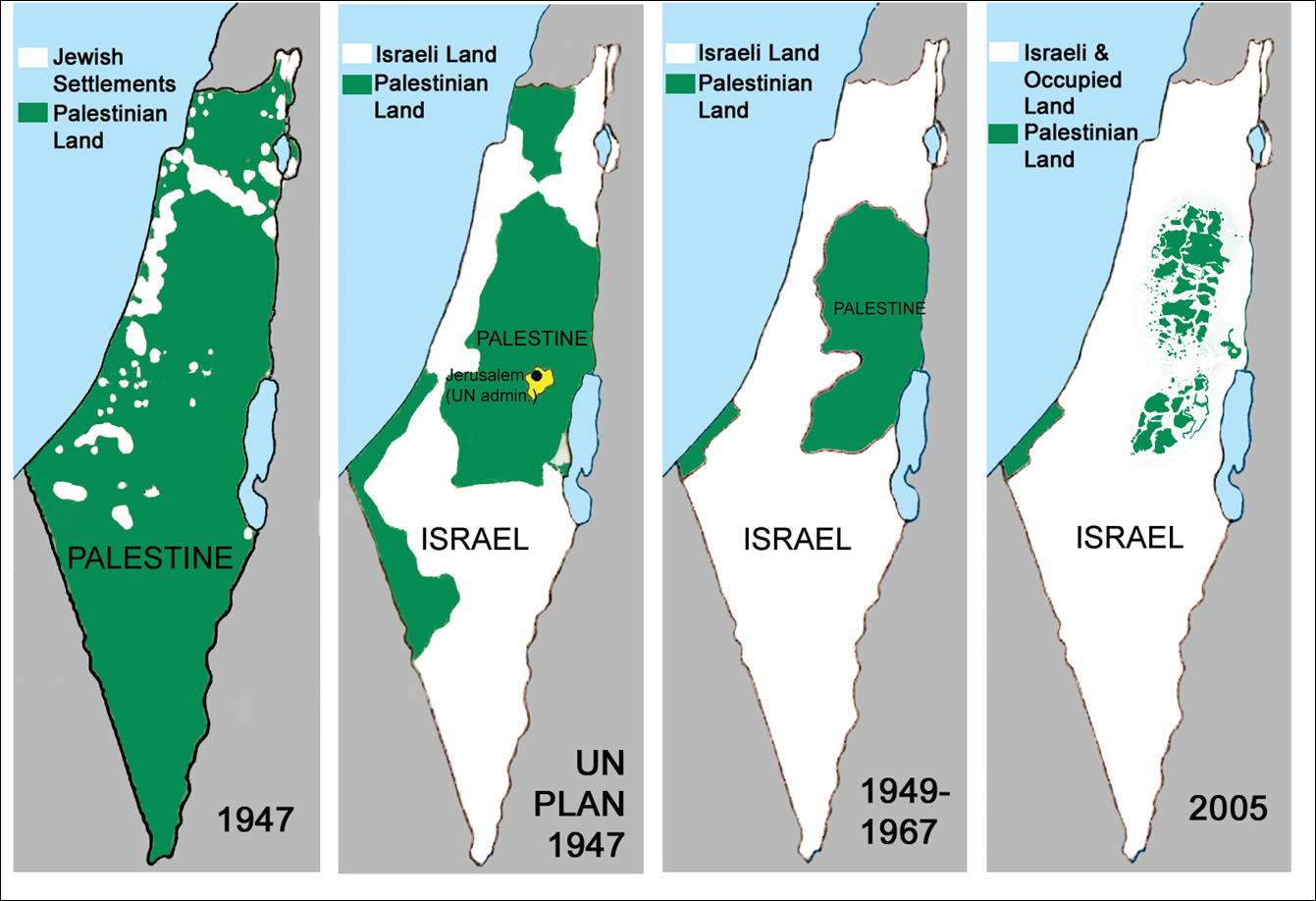
In the 19th and early 20th centuries, a movement known as Zionism was formed, advocating a homeland for Jewish people in the, then British occupied, land of Palestine. At the same time, the majority Arabic population, who had lived in Palestine for generations, desired independence from the British in the form of an independent Arabic state. In 1917 the British released the Balfour Declaration, which expressed full support to the Zionist movement. The Palestinian people, angered by the British completely ignoring their interests, began protests and rioting against Jewish occupation as early as 1920. These protests were largely led by Amin al-Husseini, the Grand Mufti of Jerusalem.[3]
Arab Revolt (1936–1939)[edit | edit source]
Starting April 19, 1936, a mass strike against the British instatement of Zionism in the region was formulated. The strike was organized by the Arab Higher Committee, a Palestinian independence movement under the leadership of Amin al-Husseini. This strike eventually led to violent insurgency against British rule in the countryside. The British reacted to these strikes as any imperialist power would; through violent suppression. The British seized and searched property, often without warrants, tortured Palestinian prisoners, and deported Palestinian people from their homeland. There were also many violent encounters between Palestinian resistance, the British army, and Zionist paramilitary groups.
By the time it concluded in September 1939, more than 5,000 Arabs, over 300 Jews and 262 Britons had been killed, and at least 15,000 Arabs were wounded.[4]
Lastly, these strikes resulted in the further deterioration of Palestinian resistance, which gave the Zionists easy access to the Palestinian rural areas, intensifying their ethnic cleansing campaigns.
Partition plan (UN Resolution 181)[edit | edit source]
The Plan[edit | edit source]
Unable to resolve the conflict between Palestinians and settlers, Britain withdrew from Palestine in February 1947 and transferred the matter to the UN, which in turn created and entrusted it to UNSCOP (United Nations Special Committee on Palestine) in May 1947.
While UNSCOP did deliberate about the possibility of a democratic one-state solution, whose future would be determined through democratic organs, they ended up adopting a partition plan which divided Palestine into two states: "Israel", occupying 56% of all Palestinian land and containing the Eastern Galilee, a coastal area (including Haifa, Tel Aviv, and most fertile lowland plains) and most of the Negev, and Palestine, consisting of the remaining territories, except for Jerusalem, which was to be considered corpus separatum.[5] Additionally, it is also worth mentioning that even within the UN-proposed state, settlers owned only 11% of the land and were the minority in every single district, further adding to the absurdity that was this plan.[6]
After November 1947, as a way of protesting against the blind-eye that the UN was turning to the Palestinians who overwhelmingly rejected the proposed plan, the Arab League and the Arab Higher Committee decided to boycott further negotiations with UNSCOP.[7]
The Palestinian Response[edit | edit source]
As stated earlier, the Arab League further refused to negotiate with UNSCOP. This fact is often used to support the argument that Palestinians would have a better state had they accepted the Partition Plan. However, this couldn't be further from the truth, as in order to say this one has to ignore the entire history of the Zionist movement, its settler-colonial ambitions, very much aligned with European Imperialist nations[8], and how it always advocated for the systematic expulsion of the Palestinians from their own land.[9] By allowing this plan to come into fruition, the UN had fundamentally violated its own human rights charter.
Several leading Palestinians also attempted to get the International Court of Justice (ICJ) involved in order to question the ethics of the plan, namely if the UN had the authority to forcefully execute the resolution[10] without the approval of the overwhelming majority of Palestinians[11] violated the UN human rights charter; a counter resolution was passed to give the UN the authority to do so.[12]
Furthermore, it is natural that Palestinians rejected this plan, as it went directly against their interests (and violated their right of self-determination) and would further intensify the ethnic cleansing operations. Therefore, it is obvious that such a plan could only be enacted by overwhelming force, since it is obviously impossible to forcibly expand the colonizer's reach from 6%[13] to almost 56%[14] of all Palestinian land without Palestinian support.
Zionist colonization (1948–present)[edit | edit source]
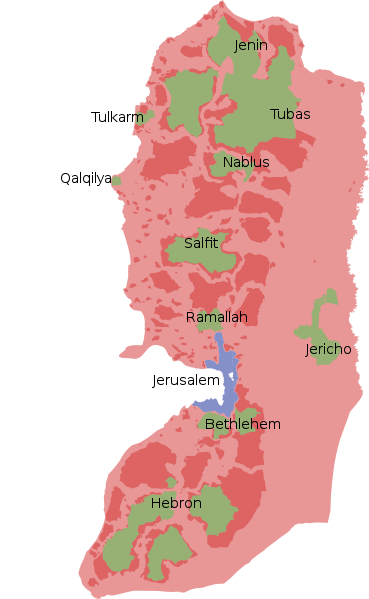
Red: Joint control
Blue and pink: "Israeli" control
See main article: Palestinian genocide
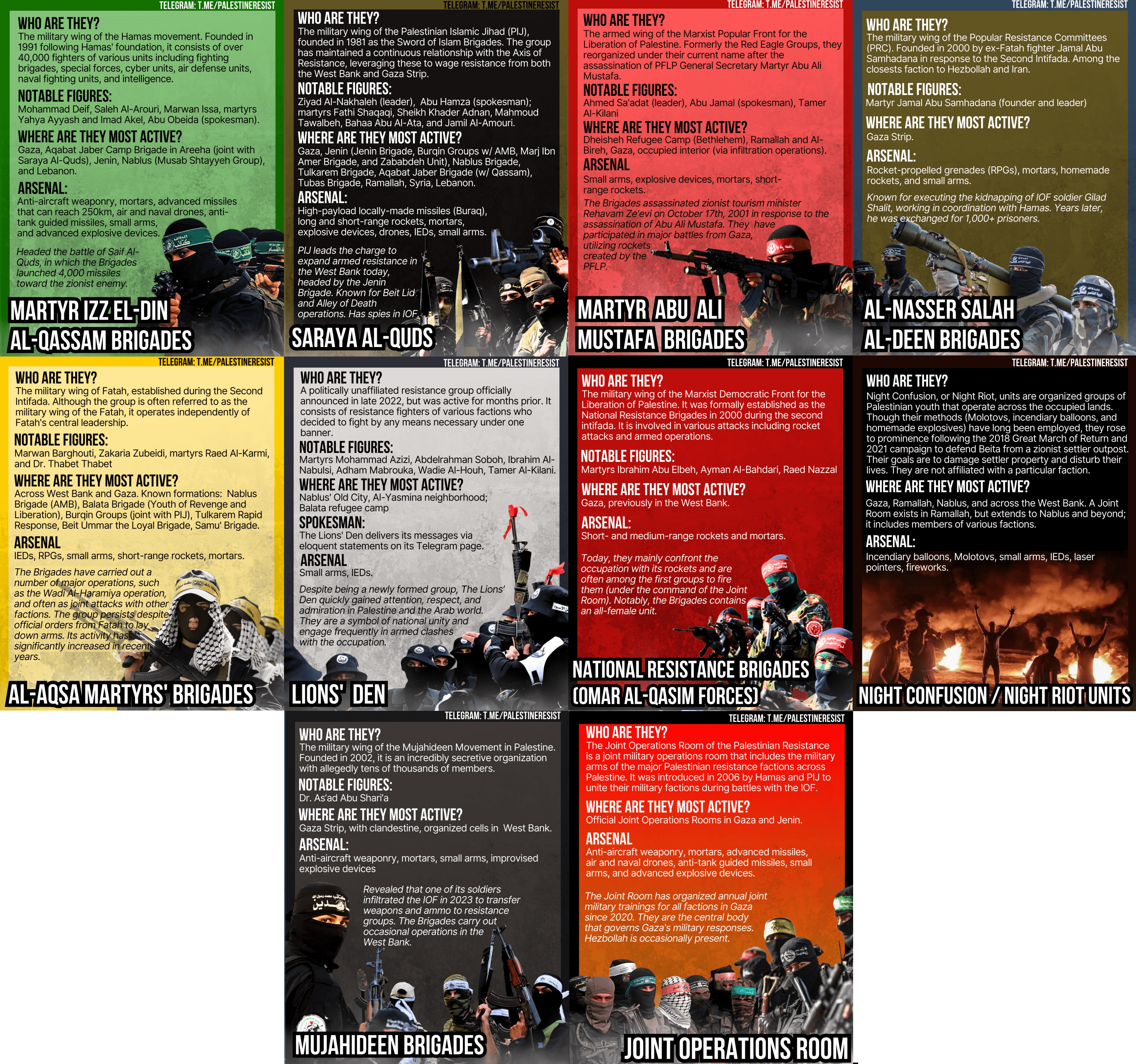
Territory[edit | edit source]
Before 1948, Palestine consisted of all of the land on the land on the Sinai Peninsula outside of Egypt. In 1948, the area was forcibly partitioned into two states, "Israel" and Palestine. The Zionist Entity was not satisfied with its territory and soon annexed 60% of Palestinian land in the Arab–"Israeli" War.[15] During the Six-Day War in 1967, the Zionist Entity invaded the rest of Palestine and annexed East Jerusalem.[16] Most of the West Bank is now occupied by "Israel".[17]
Further reading[edit | edit source]
References[edit | edit source]
- ↑ "An Open Letter to Robert F. Kennedy Jr" (2023-08-11). MintPress News. Archived from the original on 2023-08-12.
- ↑ Miko Peled (2023-08-11). "An Open Letter to Robert F. Kennedy Jr" MintPress News. Archived from the original on 2023-08-12.
- ↑ “The combined impact of Britain's military and diplomatic efforts brought the rebellion to an end in the late summer of 1939. Over the revolt's three years, some 5,000 Palestinians had been killed and nearly 15,000 wounded. The Palestinian leadership had been exiled, assassinated, imprisoned, and made to turn against one another. At the same time, the White Paper—despite its limitations—offered certain concessions to the rebels' demands. Whatever gains Palestinians might have made through the revolt, however, were quickly overtaken by the larger geopolitical processes of World War II , and the combined British-Zionist assault on Palestinian political and social life during the revolt had a long-lasting impact.”
Alex Winder (2024-06-14). "Great Arab Revolt, 1936-1939" Palquest. Archived from the original on January 29th 2024. Retrieved June 14th 2024. - ↑ “The combined impact of Britain's military and diplomatic efforts brought the rebellion to an end in the late summer of 1939. Over the revolt's three years, some 5,000 Palestinians had been killed and nearly 15,000 wounded. The Palestinian leadership had been exiled, assassinated, imprisoned, and made to turn against one another. At the same time, the White Paper—despite its limitations—offered certain concessions to the rebels' demands. Whatever gains Palestinians might have made through the revolt, however, were quickly overtaken by the larger geopolitical processes of World War II , and the combined British-Zionist assault on Palestinian political and social life during the revolt had a long-lasting impact.”
Alex Winder. "Great Arab Revolt, 1936-1939" Palquest. Archived from the original on January 29th 2024. Retrieved June 14th 2024. - ↑ “The proposed Jewish state covered some 56 percent of Mandate Palestine divided into three barely contiguous parts/areas: the eastern Galilee (including Safad, Tiberias, Baysan, and the Sea of Galilee), a coastal area (about two-thirds of Palestine's coast, including Haifa, Tel Aviv, and the fertile lowland plains), and most of the Negev (excluding Bir al-Sabi' and a strip/area running about half-way down the border with Egypt, but giving access to the Red Sea). Of Mandate Palestine's sixteen districts, nine were allotted to the Jewish state, only one of which had a Jewish majority; the UN-proposed Jewish state as a whole had an Arab “minority” approaching 47 percent.”
Alex Winder. "UN Partition Plan, 1947" Palquest. Archived from the original on 2024-1-9. Retrieved 2024-6-20. - ↑ “The injustice was as striking then as it appears now, and yet it was hardly commented on at the time by any of the leading Western newspapers then covering Palestine: the Jews, who owned less than six per cent of the total land area of Palestine and constituted no more than one third of the population, were handed more than half of its overall territory. Within the borders of their UN -proposed state, they owned only eleven per cent of the land, and were the minority in every district”
Ilan Pappe (2006). The Ethnic Cleansing of Palestine: 'Chapter 3; The Arab and Palestinian Positions' (p. 34). [PDF] Oneworld. ISBN 9781851684670 [LG] - ↑ “The Arab League, the regional inter-Arab Organisation, and the Arab Higher Committee (the embryonic Palestinian government) decided to boycott the negotiations with UNSCOP prior to the UN resolution, and did not take part in the deliberations on how best to implement it after November 1947. Into this vacuum the Zionist leadership stepped with ease and confidence, quickly setting up a bilateral dialogue with the UN on how to work out a scheme for the future of Palestine.”
Ilan Pappe (2006). The Ethnic Cleansing of Palestine: 'Chapter 3; The UN's Partition Plan' (p. 32). Oneworld. ISBN 9781851684670 [LG] - ↑ “Throughout these and other talks, Herzl reiterates the identity of interests between imperialism and Zionism, arguing that British support of his plans would ensure pro-British fifth columnists as well as markets. "In some short years the Empire would be richer by a rich colony," and, he adds, in reference to the Jews: "at one stroke England will get ten million secret subjects," "ten million agents for her greatness and her influence," who would also cater to the English market”
Stephen Halbrook (1972). The Class Origins of Zionist Ideology (p. 98). [PDF] California: University of California Press. - ↑ ““We should go east, into Transjordan. That would be a test for our movement.”
“Nonsense… isn’t there enough land in Judea and Galilee?”
“The land in Judea and Galilee is occupied by the Arabs.”
“Well, we’ll take it from them.”
“How?” (Silence.)
“A revolutionary doesn’t ask naive questions.”
“Well then, ‘revolutionary,’ tell us how.”
“It is very simple, we’ll harass them until they get out… Let them go to Transjordan.”
“And are we going to abandon all of Transjordan?” asks an anxious voice.
“As soon as we have a big settlement here we’ll seize the land, we’ll become strong, and then we’ll take care of the Left Bank [of the Jordan River], we’ll expel them from there, too. Let them go back to the Arab countries.””
"Myth: Israel was created as penance for the Holocaust". Decolonize Palestine. Archived from the original on May 21 2024. Retrieved June 21 2024. - ↑ “The Arab delegations requested that before a decision be taken, the International
Court of Justice be asked for its opinion on the following subjects: (a) whether or not Palestine was included in the Arab territories that had been promised independence by Britain at the end of World War I; (b) whether partition was consistent with the objectives and provisions of the Mandate; (c) whether partition was consistent with the principles of the UN Charter; (d) whether its adoption and forcible execution were within the competence or jurisdiction of the UN; and (e) whether it lay within the power of any UN member or group of members to implement partition without the consent of the majority of the people living within the country.”
Walid Khalidi (1997). Revisiting the UNGA Partition Plan Resolution (p. 9). [PDF] Journal of Palestine Studies. - ↑ “The partition resolution meant, in effect, the establishment of a Zionist state on Palestinian soil irrespective of the wishes of the overwhelming majority of its inhabitants and was taken by the Zionist leadership as a green light to launch their long-contemplated and delayed conquest of such a state.”
Walid Khalidi (1997). Revisiting the UNGA Partition Resolution (p. 1). [PDF] Journal of Palestine Studies. - ↑ “The draft counter resolution that said that the UN did have the authority was carried by only 21 votes to 20 in the Ad Hoc Committee whose total membership was 57.”
Walid Khalidi (1997). Revisiting the UNGA Partition Resolution (p. 9). [PDF] Journal of Palestinian Studies. - ↑ “The injustice was as striking then as it appears now, and yet it was hardly commented on at the time by any of the leading Western newspapers then covering Palestine: the Jews, who owned less than six per cent of the total”
Ilan Pappe (2006). The Ethnic Cleansing of Palestine: 'Chapter 3; The Arab and Palestinian Positions' (p. 34). [PDF] Oneworld. ISBN 9781851684670 [LG] - ↑ “If we consider that most of this population arrived during the 4th and 5th Aliyot (Between 1924-1939), then the majority of those demanding partition of the land had barely been living there for 20 years at the most. To make matters worse, the UN partition plan allotted approximately 56% of the land of mandatory Palestine to the Jewish state.”
"Myth: Had Palestinians accepted the 1947 partition plan, they would have had a state by now". Decolonize Palestine. Archived from the original on May 21 2024. Retrieved June 21 2024. - ↑ Area of Jurisdiction and Powers Ordinance (1948) (1948) (p. 57). israellawresourcecenter.org.
- ↑ Milestones: 1961–1968 (2018). Office of the Historian.
- ↑ "Applicability of the Geneva Convention relative to the Protection of Civilian Persons in Time of War, of 12 August 1949, to the Occupied Palestinian Territory, including Jerusalem, and the other occupied Arab territories" (2003-12-17). United Nations. Archived from the original on 2007-06-03. Retrieved 2022-01-03.
